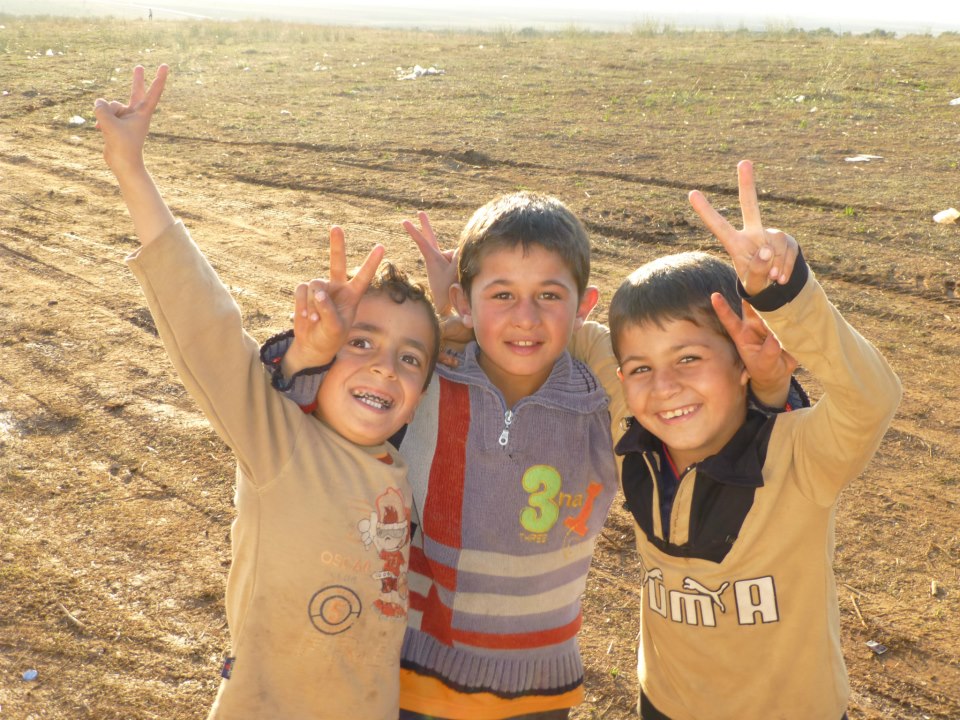 Olive Tree Refugee Camp (Sarab Al-Jijakli)Amal Hanano writes for The National:
Olive Tree Refugee Camp (Sarab Al-Jijakli)Amal Hanano writes for The National:
On New Year's Eve, while the world counted down the minutes until 2013, celebrating with loud blasts of fireworks in the sky, a tent with seven sleeping children and a mother in the Olive Tree refugee camp near the Syrian village of Atmeh burst into flames. On the first day of the new year, five of the children were dead.
One day before the devastating fire, I visited the Olive Tree refugee camp. The four-month-old sprawling camp occupies a hill covered with olive trees on Syrian land along the barbed-wire Turkish border. Walking on the muddy path among the rows of the 1,200 tents that shelter between 8,000 and 12,000 Syrian refugees, I was surrounded by children. They gathered around and followed the visitors, asking questions, singing songs and explaining in simple phrases details about their everyday life. Most sentences begin with "we don't have": we don't have water, we don't have electricity, we don't have food, we don't have toys, we don't have....
The children moved through the camp in groups, some carrying olive tree branches for firewood, others gathered around their mothers who were cooking weed-like greens picked from the land to supplement the dinner rations that are never enough to feed the families. Most are not dressed warmly enough for the cold and almost none of them still go to school. People in the camp that day told me over and over: "We left our homes for our children." But looking at the underfunded, muddy camp with its open sewers and lack of basic services, you wonder what kind of home this is for a child?
The women were busy at the tent entrances, some cooking, some tending to infants, and others clipping wet, drab clothes onto lines stretched between the tents. A woman named Manar, dressed in her only outfit, a rust-coloured velvet galabiyeh, invited me inside to tell me the story of a fire that had happened just 15 days before.
I ducked into her tent and sat on the concrete blocks that separated the muddy entrance from the sparse interior with a few thin mattresses and blankets piled in the corner. Manar is only in her twenties but looks older, worn out. Her eyes filled with tears as she began, "What should I tell you? My heart is burnt, my heart is burnt. Everything I had was burnt."
Two weeks ago, Manar left her two sleeping children, five-year-old daughter Fatima and three-year-old son Diya', in the tent while she trekked to the women's bathrooms across the camp. A few minutes later, on her way back, she saw clouds of smoke rising from her row and realised her tent had caught fire from a candle she had left burning inside. "I ran barefoot to the tent screaming, 'My children, my children.' The people didn't let me inside. Within five minutes the smouldering tent had melted onto the ground. A man named Abdallah wrapped my son in his jacket. Pieces of my son's skin are still on the fabric."
The camp's director, Yakzan Shishakly, later told me that Manar's son was taken for emergency care in Turkey before he died the next day. Her daughter perished immediately.
Manar spoke slowly through her tears, holding her small Nokia phone in her hands, clicking between five photographs: two of her son, one of her daughter, and an image of each of their small graves. She paused between the images, crying, stroking, remembering.
"I fled with them here from so far away to be safe. We fled our home in Binnish because of the shelling. They were my entire life. I don't care about my life any more. I lost my home, my children, my possessions, what's left to lose? All I have is dirt; no Diya' and no Fatima."